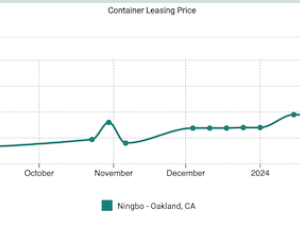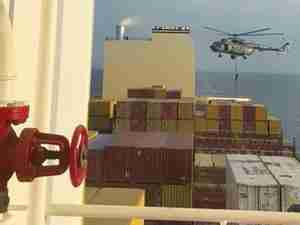Two freight transport experts today called for the creation of 'fast track' ocean cargo services that can provide shippers reliable and timely delivery of Asian imports. Brian Clancy and David Hoppin of Arlington-based MergeGlobal issued a research paper concluding that innovative concepts are needed to take the variability out of international supply chains and ease the pain caused by a congested US freight transport system.
Their 16-page report, Coping With Uncertainty, urges transportation providers to use existing technology and business models to create faster, more reliable ocean transportation products ' especially in the Less Than Containerload (LCL) market.
'Why not create a 'fast track' for LCL shipments that receive expedited processing at both the load and discharge ports, and then are injected directly into an LTL network for delivery to consignees?' asked Clancy and Hoppin, managing directors at the transportation and logistics consultancy.
Their research project was sponsored by supply chain services provider APL Logistics and Con-way Freight, the less-than-truckload freight delivery company. The two firms launched OceanGuaranteed in 2006, a day-definite guaranteed LCL product for shipments from Asia to the US.
In their report, Clancy and Hoppin identified three primary concerns for shippers managing international supply chains:
- Controlling total distribution cost, which is the sum of transport and inventory-carrying costs;
- Minimizing transit time variability; and
- Coping with a network of US ports, railways and highways that is nearing capacity.
The research paper identified transit time variability as one of the 'hidden costs' of international supply chains. Unexpectedly late product deliveries can result in lost sales and inventory write-downs, said the paper's authors ' costs that may not always be readily identified. Focusing on a total distribution cost framework can help shippers uncover and manage hidden costs, thereby improving margins.
To counteract longer transits and transit time variability, shippers are increasingly forced to carry higher levels of costly 'safety stock,' the researchers said, or turn to airfreight. The air option is quick and reliable, they pointed out, but seven to 10 times more expensive than ocean transportation.
Clancy and Hoppin recommended a 'marriage' of an ocean carrier's ships and terminals with a large LTL carrier's dedicated fleet and distribution network to offer relatively fast, reliable service from origin ports in China to consignee doors in the US The researchers said such a partnership could minimize international supply chain disruption through closer carrier integration.
According to Clancy and Hoppin, a recent survey indicates that shippers value reliability more than price when it comes to ocean transportation. They added, however, that conventional ocean LCL service is widely perceived to be the least reliable cargo option. That's why they called for 'fast track' LCL shipments.
'Such a service could shave multiple days from average port-to-door transit times,' the researchers said, 'and if operated to a rigid schedule, could offer guaranteed delivery on the promised day, thereby reducing safety stocks and enabling much more cost-effective control of inventory and warehouse labor management.'
Clancy and Hoppin said such a service would be priced higher than traditional ocean LCL products but could reduce a shipper's total distribution cost by reducing inventory-related expenses and other expenses associated with transit delays and the multiple 'hand-offs' that occur with traditional LCL products.
For a copy of the report Coping with Uncertainty, visit the News section of www.apllogistics.com or the Con-way web site at www.con-way.com/ocean.







